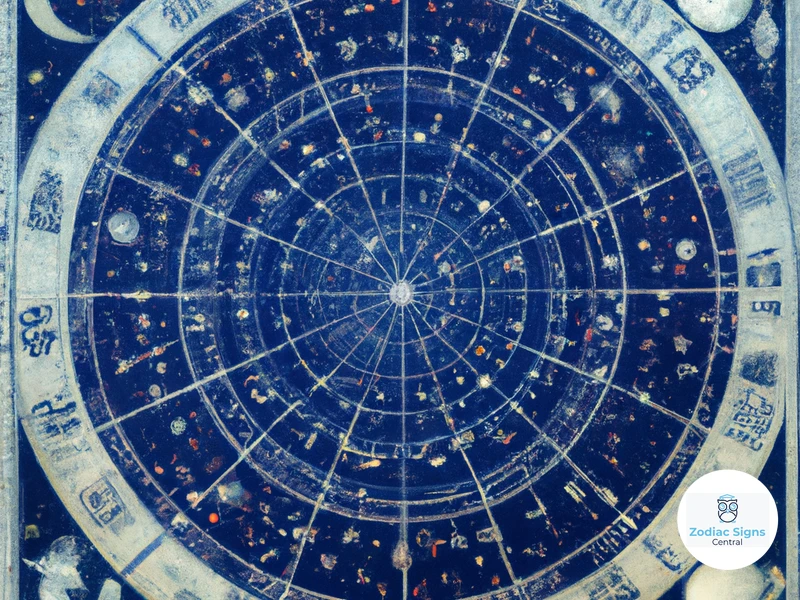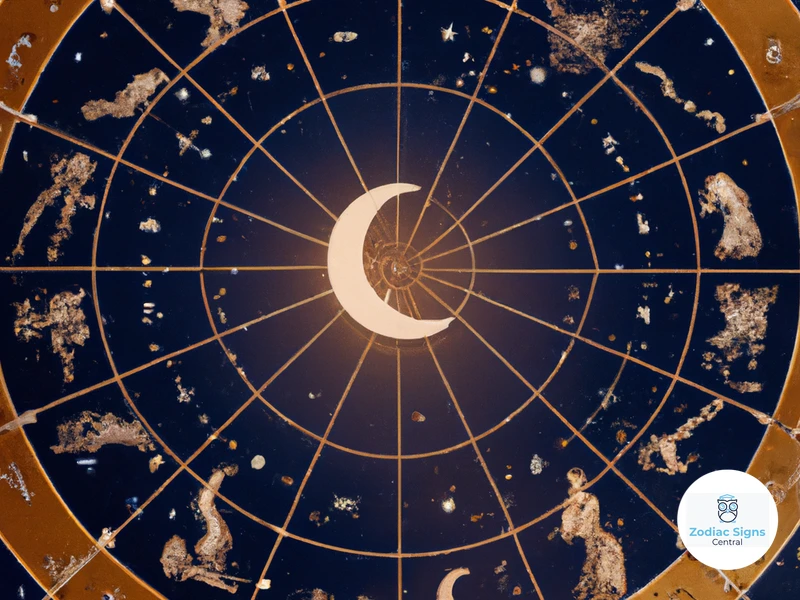The Origins and Evolution of Western Astrology

Astrology, the belief in the influence of celestial bodies on human affairs, has been a fascinating subject for centuries. The origins of Western astrology can be traced back to ancient civilizations such as Mesopotamia, Egypt, and Greece. Over time, it has evolved and adapted, influenced by notable figures like Ptolemy in the Hellenistic period and Islamic scholars during the Medieval Era. Astrology flourished in the Renaissance and experienced a revival, leading to its development into psychological astrology in the modern age. Today, astrology continues to captivate people worldwide, with the emergence of New Age astrology and its widespread popularity. In this article, we will delve into the rich history of astrology, exploring its ancient beginnings, the Hellenistic period, the Medieval Era, and its journey into the modern age.
Ancient Beginnings
The ancient beginnings of Western astrology can be traced back to the rich and diverse civilizations of Mesopotamia, Egypt, and Greece. The Babylonians of Mesopotamia were among the first to observe and document the movements of celestial bodies. They believed that these heavenly bodies held significant power and influence over human life. The Egyptians, too, had a profound connection with astrology, associating it with their worship of the sun god Ra. However, it was the Greeks who truly shaped and refined the practice of astrology. Greek philosophers like Plato and Aristotle believed that the positions of the stars and planets affected not only the physical world but also the human psyche. They saw astrology as a key tool for understanding and predicting human behavior. These early civilizations laid the foundation for the study of astrology, shaping its fundamental principles and setting the stage for its later development.
The Babylonians and Mesopotamia
The Babylonians of Mesopotamia played a crucial role in the development of astrology. They were one of the earliest civilizations to observe and record the movements of celestial bodies, recognizing the correlation between these celestial events and earthly occurrences. The Babylonians believed that the stars and planets held immense power and influence over human life. They meticulously documented and studied celestial phenomena, creating what is known as the Babylonian Zodiac. This zodiac system consisted of twelve constellations that corresponded to specific months of the year. Each constellation was associated with certain qualities and characteristics that were believed to influence individuals born during that period. The Babylonians also developed intricate astrological techniques, such as horoscopes and birth charts, to gain insights into an individual’s personality and predict future events. These early practices laid the foundation for the later evolution of astrology and its widespread influence throughout different cultures and time periods. To this day, the Babylonian contributions to astrology continue to shape our understanding of the cosmos and its impact on human life.
The Influence of Egypt and Greece
The influence of Egypt and Greece on Western astrology cannot be overstated. In ancient Egypt, astrology was deeply intertwined with their religious beliefs and practices. The Egyptians worshipped a multitude of gods, many of which were associated with celestial bodies, such as Ra, the sun god. They believed that the movements of these celestial bodies held great significance and could provide insight into the lives of individuals and the fate of the nation. The Egyptians developed sophisticated systems to track celestial movements and created early horoscopes based on the alignment of the stars and planets at the time of a person’s birth.
Greece, known for its rich intellectual tradition, played a pivotal role in shaping astrology as a field of study. Greek philosophers and scholars, including Plato and Aristotle, viewed astrology as a legitimate science that could reveal the intricate relationship between the cosmos and human life. They believed that the positions and movements of the stars and planets held profound influence over individual temperament, character, and destiny. The Greeks developed a system of twelve zodiac signs, each representing different personality traits and governing various aspects of life.
It was also during this time that astrology began to make connections between celestial bodies and the four classical elements – fire, earth, air, and water. These elements were believed to have an impact on different zodiac signs and influenced their characteristics. For example, the element of water is associated with emotional depth, intuition, and secrecy, making it a defining trait of Scorpio, as explored in this article. The Greeks’ meticulous observations and philosophical insights laid the groundwork for subsequent developments in astrology, ensuring its enduring influence on Western thought.
The Hellenistic Period

During the Hellenistic period, astrology underwent significant developments that shaped its course for centuries to come. One of the key figures during this time was Claudius Ptolemy, an influential scholar whose work had a profound impact on the field of astrology. Ptolemy’s book titled “Tetrabiblos” served as a comprehensive guide to astrology, exploring topics such as horoscopes, planetary movements, and the interpretation of celestial phenomena. Ptolemy’s work emphasized the significance of the zodiac in astrology and introduced the concept of the twelve astrological houses. Additionally, the Hellenistic period witnessed the rise of horoscopic astrology, which involved casting specific charts known as horoscopes to gain insight into an individual’s personality traits and future prospects. This period laid the foundation for the use of astrology as a tool for understanding human behavior and predicting events, establishing astrological techniques that are still employed to this day. The Hellenistic period marked a crucial phase in the evolution of Western astrology, solidifying its importance and influence in society.
Ptolemy and the Birth of Astrology
Ptolemy, a prominent figure in the Hellenistic period, played a crucial role in the development and popularization of astrology. His influential work, “Tetrabiblos,” laid the foundations for astrological theory and practice, earning him the title of the “father of Western astrology.” Ptolemy’s work was comprehensive, covering various aspects of astrology such as natal astrology (analyzing a person’s birth chart), electional astrology (choosing auspicious times for events), and mundane astrology (predicting global events). In “Tetrabiblos”, Ptolemy emphasized the significance of planetary placements and aspects in interpreting astrological charts. He provided a systematic approach to understanding the influence of celestial bodies on human life, distinguishing astrology from mere divination. Ptolemy’s work was based on the geocentric model, assuming that Earth was at the center of the universe and all celestial bodies revolved around it. This geocentric perspective remained influential for centuries, shaping the way astrology was studied and practiced. Ptolemy’s contribution to astrology solidified its position as a legitimate field of study and set the stage for its continued development in the centuries to come.
The Role of the Zodiac
The Role of the Zodiac in Western astrology is crucial for understanding personality traits and predicting future events. The Zodiac is a circle divided into twelve equal parts, each representing a specific constellation and corresponding astrological sign. These signs, also known as Sun signs, play a significant role in determining an individual’s characteristics and behavior patterns. Aries, for example, is associated with courage and leadership, while Taurus represents stability and practicality. The Zodiac acts as a framework through which astrologers interpret the influence of celestial bodies on human life. Each sign is further influenced by planetary placements, such as the position of the Moon and the ascendant at the time of birth. This combination creates a unique astrological profile for each person, contributing to their overall personality and life experiences. The Zodiac also helps astrologers make predictions and provide guidance based on the alignment of planets and their interactions with different signs. Understanding the role of the Zodiac allows individuals to gain insight into their strengths, weaknesses, and potential paths in life. By harnessing the wisdom of the Zodiac, individuals can explore their own cosmic energies and navigate their spiritual journey with mindfulness and self-awareness.
The Medieval Era
During the Medieval Era, astrology experienced significant developments and influences, particularly through Islamic contributions. Islamic scholars, including Al-Kindi, Al-Kindi, Al-Farabi, and Al-Biruni, sought to enhance the practice of astrology by integrating their scientific knowledge with the works of ancient Greek and Persian astrologers. They translated and expanded upon these texts, further refining astrological techniques and introducing new concepts such as the astrological houses. Islamic astrologers recognized the importance of accurate calculations and precise chart interpretations, leading to advancements in mathematics and astronomy. Astrology during this era also drew upon philosophical ideas from Islamic scholars, blending spirituality with astrological insights. This synthesis of knowledge from various fields fostered a deeper understanding of the cosmos and its influence on human destiny. The Medieval Era laid the groundwork for astrology’s later revival in the Renaissance period, where its significance and popularity would soar once again.
Islamic Contributions to Astrology
Islamic scholars made significant contributions to the field of astrology during the Medieval Era. This period, also known as the Islamic Golden Age, witnessed a flourishing of knowledge and scientific advancements across various disciplines. Scholars such as Abu Ma’shar and Al-Kindi played crucial roles in translating and preserving ancient Greek and Roman astrological texts. These Islamic astrologers also introduced their own ideas and methodologies, blending them with existing knowledge to create a unique Islamic perspective on astrology. They developed intricate systems for interpreting celestial events and their impact on human life, integrating astrology with other disciplines such as astronomy, mathematics, and philosophy. Islamic contributions to astrology went beyond theoretical developments. Islamic rulers and caliphs patronized and supported astrological practices, recognizing the usefulness of astrology in governance, agriculture, medicine, and predicting natural disasters. Thanks to Islamic scholars, astrology continued to evolve and expand, laying the groundwork for future advancements in the field. The influence of these contributions is still felt in contemporary astrology, as astrologers continue to study and explore the rich heritage of Islamic astrological knowledge.
The Renaissance and the Revival of Astrology
During the Renaissance, Western astrology experienced a significant revival, with scholars and philosophers taking a keen interest in its principles. Astrology was deeply intertwined with other areas of knowledge, such as astronomy, mathematics, and medicine. One of the key figures during this period was Marsilio Ficino, an Italian philosopher and astrologer who translated many ancient texts on astrology into Latin. Ficino believed that astrology could help individuals better understand themselves and their place in the world. His work sparked a renewed fascination with astrology among intellectuals and scholars across Europe.
Another prominent figure during the Renaissance was Johannes Kepler, a German mathematician and astronomer who contributed greatly to the field of astrology. Kepler believed that astrology could be explained and understood through scientific principles, and he sought to create a more rigorous and systematic approach to astrological interpretation. His works, such as “On the More Certain Fundamentals of Astrology” and “De fundamentis astrologiae certioribus,” laid the groundwork for the integration of astrology and astronomy.
The revival of astrology during the Renaissance also led to increased interest in astrological predictions and forecasting. Almanacs and astrological calendars became popular, with people consulting them to gain insights into future events, weather patterns, and agricultural practices.
The Renaissance period breathed new life into astrology, elevating it from a purely mystical art to a subject of scholarly study and scientific exploration. The renewed interest in astrology during this time not only preserved and translated ancient astrological texts but also laid the groundwork for its further development in the centuries to come.
To learn more about the powerful influence of astrology on daily life and personal growth, you may want to explore the concept of astrology and mindfulness in harnessing cosmic energies.
The Modern Age

In the modern age, astrology has undergone significant transformations and adaptations, leading to the emergence of new branches and a surge in popularity. One notable development is the rise of psychological astrology, which focuses on the deeper psychological aspects of individuals and their connection to the cosmic energies. This shift is heavily influenced by renowned psychologists such as Carl Jung, who saw astrology as a valuable tool for self-exploration and understanding. The advent of the New Age movement has contributed to the widespread appeal of astrology. New Age astrology emphasizes spirituality, mindfulness, and harnessing cosmic energies to achieve personal growth and enlightenment. This contemporary approach has resonated with many individuals seeking a deeper connection with the universe and a greater understanding of themselves. As astrology continues to evolve and adapt to the needs of the modern world, it maintains its position as a source of guidance, self-reflection, and empowerment for countless individuals.
Psychological Astrology
Psychological astrology, also known as modern astrology, emerged in the early 20th century and marked a significant shift in the interpretation and application of astrological principles. It shifted the focus from deterministic predictions to a more psychological and introspective approach. One of the key figures in the development of psychological astrology was Swiss psychiatrist Carl Jung, who believed that astrology could provide valuable insights into an individual’s personality and unconscious motivations. Jung’s ideas about archetypes, the collective unconscious, and the integration of opposites influenced modern astrologers and introduced psychological concepts into astrological interpretations. In psychological astrology, the birth chart is seen as a symbolic representation of an individual’s psychological makeup and potential for personal growth. Astrologers analyze the unique placements of planets, signs, and aspects to gain insights into an individual’s inner world, including their desires, fears, and patterns of behavior. This approach emphasizes self-awareness, personal development, and understanding the complexities of the human psyche. Psychological astrology has gained popularity for its ability to provide individuals with a deeper understanding of themselves, their motivations, and their relationships. It allows individuals to explore their strengths, challenges, and potential for growth through the lens of astrological symbolism. By integrating psychology and astrology, psychological astrology offers a holistic approach to self-discovery and personal transformation.
New Age Astrology and its Popularity
New Age astrology refers to a contemporary movement that emerged in the late 20th century, characterized by a more spiritual and holistic approach to astrology. It gained popularity as people sought alternative forms of self-discovery, personal growth, and connecting with the cosmos. Unlike traditional astrology that focused mainly on predictive aspects, New Age astrology emphasizes the idea that individuals have the power to shape their own destiny through self-awareness and conscious choices. It borrows elements from various spiritual practices, including yoga, mindfulness, and meditation, to provide a more holistic understanding of astrology. One notable aspect of New Age astrology is the emphasis on individuality and self-expression. This aligns with the growing interest in personal development and finding one’s unique purpose in life. With the rise of the internet and social media, New Age astrology gained even more popularity and accessibility, reaching a wider audience than ever before. Websites, blogs, and online communities dedicated to New Age astrology have sprouted, providing a platform for enthusiasts to connect, learn, and share their experiences. The appeal of New Age astrology lies in its ability to provide guidance, inspiration, and a sense of belonging in a rapidly changing world. It offers individuals a way to explore their inner worlds, discover their strengths and weaknesses, and navigate life’s challenges with a deeper understanding of themselves and the cosmic energies that surround them.
Conclusion
In conclusion, the origins and evolution of Western astrology have shaped our understanding of the cosmos and its connection to human life and behavior. From its beginnings in the ancient civilizations of Mesopotamia, Egypt, and Greece, astrology has undergone significant developments and adaptations throughout history. The contributions of notable figures like Ptolemy in the Hellenistic period and Islamic scholars during the Medieval Era further enriched the study of astrology. The Renaissance witnessed a revival of astrology, paving the way for its modern manifestation as psychological astrology. The emergence of New Age astrology in recent times has further popularized the practice and sparked widespread fascination. Astrology continues to captivate individuals seeking insight into their lives, relationships, and personal growth. By exploring the elements of water and the Scorpio personality (source), one can delve deeper into the nuances of astrological interpretations. Additionally, the study of astrology can serve as a tool for mindfulness and harnessing cosmic energies (source). It is through the exploration of astrological concepts like the Fifth House and its significance in creativity, love, and self-expression (source), that individuals can gain a deeper understanding of themselves and the world around them. Overall, the journey of Western astrology reflects the enduring human fascination with the mystical and the desire to decipher the stars to gain insight into our own lives.
Frequently Asked Questions

What is astrology?
Astrology is the belief that the positions and movements of celestial bodies, such as the sun, moon, planets, and stars, have an influence on human life and behavior.
Where did Western astrology originate?
Western astrology has its origins in ancient civilizations such as Mesopotamia, Egypt, and Greece, where the movements of celestial bodies were observed and interpreted.
What is the role of the zodiac in astrology?
The zodiac is a belt of 12 divisions, each associated with a specific constellation. In astrology, the zodiac plays a crucial role as it determines the position of the sun, moon, and planets at the time of an individual’s birth, shaping their personality traits and influencing their life path.
How did astrology evolve during the Hellenistic period?
During the Hellenistic period, astrology greatly evolved under the influence of scholars like Ptolemy. They developed sophisticated systems for calculating and interpreting astrological charts, laying the foundation for the practice as it is known today.
What were the contributions of Islamic scholars to astrology?
Islamic scholars made significant contributions to astrology during the Medieval Era. They translated and preserved ancient Greek texts, further developing astrological techniques and introducing new concepts like house division systems.
How did astrology experience a revival during the Renaissance?
The Renaissance saw a renewed interest in astrology as scholars rediscovered and studied ancient astrological texts. This led to the application of astrology in various fields, including medicine, politics, and personal guidance.
What is psychological astrology?
Psychological astrology is a branch of astrology that focuses on exploring the deep psychological dynamics and patterns within an individual’s birth chart. It aims to provide insights into an individual’s personality, motivations, and inner conflicts.
What is New Age astrology?
New Age astrology refers to a contemporary approach to astrology that incorporates spiritual and metaphysical beliefs. It emphasizes self-discovery, personal growth, and the harnessing of cosmic energies for healing and transformation.
How can astrology be used for mindfulness?
Astrology can be used as a tool for mindfulness by helping individuals become more aware of their thoughts, emotions, and actions in relation to the cosmic cycles. It encourages self-reflection and contemplation, fostering a deeper connection with oneself and the universe.
Can astrology accurately predict the future?
Astrology provides insights and possibilities based on the alignments and configurations of celestial bodies. While it can offer guidance and potential outcomes, it does not provide guaranteed predictions of the future, as free will and individual choices also play a significant role in shaping one’s life.
References
- A Brief Overview of the History of Western Astrology
- Are Zodiac Signs Real? Here’s the History Behind …
Frequently Asked Questions

What is Western astrology?
Western astrology is a system of divination that uses the positions and movements of celestial bodies, such as the sun, moon, and planets, to interpret and analyze human behavior and to predict future events.
When did Western astrology originate?
Western astrology traces its origins back to ancient Mesopotamia, around the 2nd millennium BCE, where it evolved from the Babylonian and Assyrian astrological traditions.
How did ancient civilizations contribute to the development of Western astrology?
Ancient civilizations, such as Babylon, Egypt, and Greece, played a significant role in the development and transmission of astrological knowledge. Each civilization added its own unique insights and interpretations to the practice.
Who was Ptolemy and how did he influence astrology?
Ptolemy was a Greek astronomer and mathematician who lived in the 2nd century CE. His book “Tetrabiblos” became a foundational text in Western astrology and helped establish astrology as a legitimate field of study.
What is the significance of the zodiac in Western astrology?
The zodiac is a band of the sky divided into twelve equal parts, each representing a specific constellation. The zodiac plays a crucial role in Western astrology as it provides a framework for understanding the relationships between celestial bodies and their influence on human lives.
How did Islamic scholars contribute to astrology?
During the medieval era, Islamic scholars translated and preserved ancient Greek and Roman astrological texts. They also made significant advancements in the mathematical and observational aspects of astrology.
What was the role of astrology during the Renaissance?
During the Renaissance, astrology experienced a revival and gained popularity among scholars and noble patrons. It became an integral part of courtly life and influenced various fields, including medicine and astronomy.
What is psychological astrology?
Psychological astrology focuses on the psychological aspects of an individual’s birth chart and seeks to understand the person’s personality traits, motivations, and patterns of behavior. It places emphasis on self-awareness and personal growth.
What is New Age astrology?
New Age astrology refers to a modern form of astrology that emerged in the 20th century. It incorporates elements of psychology, spirituality, and self-development, and it has gained popularity due to its focus on personal empowerment and holistic well-being.
Why has astrology remained popular throughout history?
Astrology has remained popular throughout history because it offers a sense of meaning, guidance, and connection. It provides individuals with insights into their own lives and helps them navigate the complex world around them.






